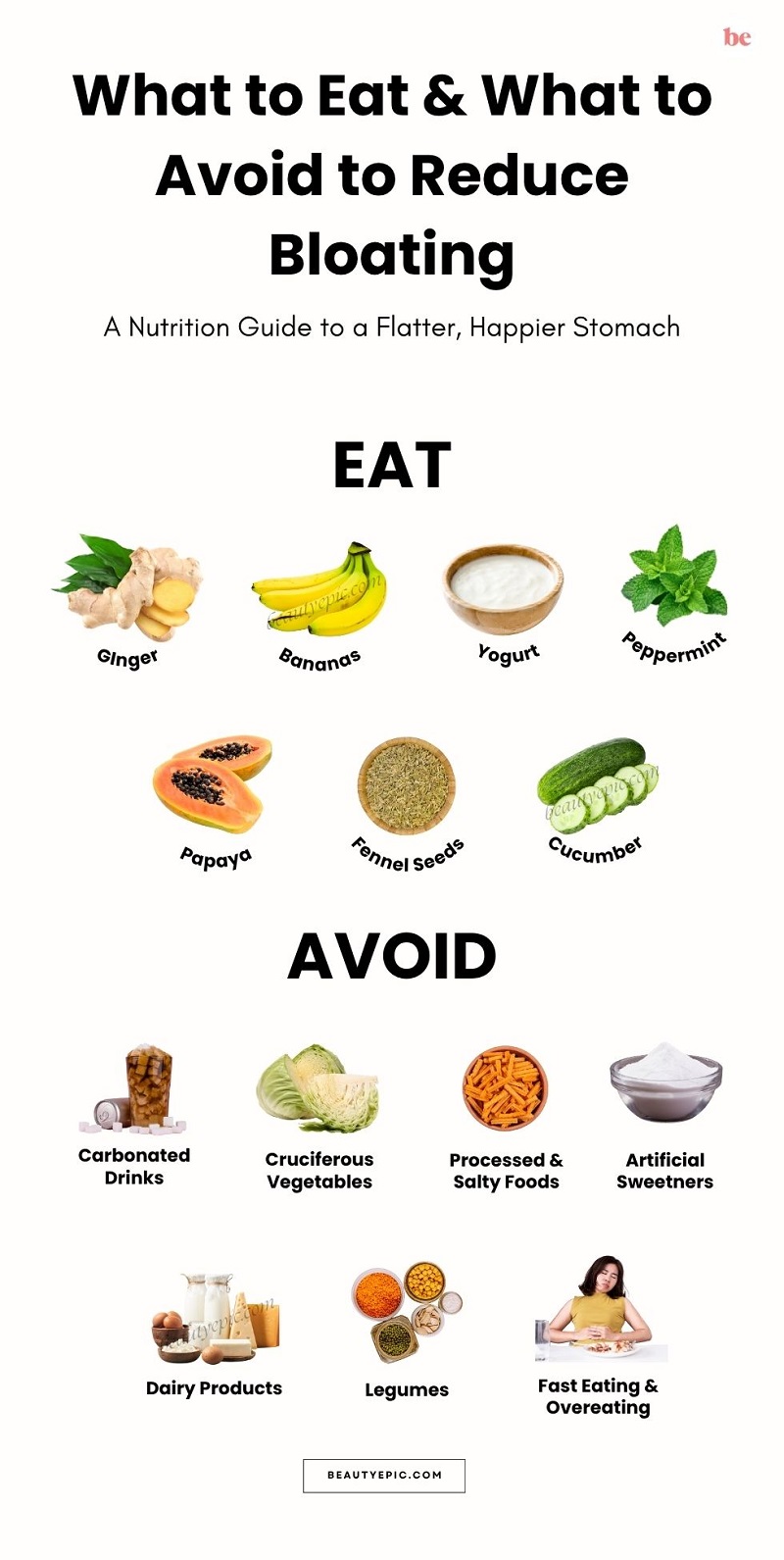
Important: This article is for informational purposes only. Please read our full disclaimer for more details.
Feeling uncomfortably full or bloated after meals is a common issue that affects millions of people daily. Bloating can make your stomach feel tight, swollen, and heavy — sometimes even painful. While it’s often temporary, persistent bloating can signal poor digestion or an imbalance in gut bacteria.
Article Contains
- Understanding Bloating: What’s Really Going On in Your Gut
- 13 Foods That Naturally Reduce Bloating
- Sip Your Way Slim: Beverages That Ease Bloating
- Steer Clear: Foods and Habits That Trigger Bloating
- Lifestyle and Prevention Tips: Keeping Bloating at Bay
- What the Science Says: Evidence Behind Anti-Bloating Foods
The good news? You don’t need to rely on quick fixes or harsh remedies. Simple dietary changes — especially incorporating certain anti-bloating foods — can make a dramatic difference. Let’s explore what causes bloating and how you can naturally deflate that uncomfortable fullness through smart food choices.
Understanding Bloating: What’s Really Going On in Your Gut
Bloating occurs when gas builds up in your digestive system, causing your abdomen to expand. This gas can come from swallowed air, slow digestion, or certain foods that ferment in the intestines. Common culprits include carbonated drinks, high-sodium meals, processed foods, and artificial sweeteners.
According to the American Gastroenterological Association, about 30% of adults experience bloating regularly (1). While it’s usually harmless, it can cause discomfort, fatigue, and self-consciousness. Fortunately, the foods you eat — and avoid — can help manage it effectively.
13 Foods That Naturally Reduce Bloating
1. Ginger
Ginger has long been used as a digestive aid. It contains gingerols and shogaols, compounds that help speed up stomach emptying and reduce gas formation. A study in the World Journal of Gastroenterology (2018) found that ginger helps improve gut motility and relieves bloating symptoms effectively (2)(3).
2. Bananas
Rich in potassium, bananas help balance sodium levels in the body — reducing water retention, a common cause of bloating. They’re also gentle on the stomach and provide prebiotic fiber to support healthy gut bacteria.
3. Cucumber
Cucumbers have a high water content and contain cucurbitacin, which helps reduce inflammation in the digestive tract. Eating them raw or adding them to infused water helps flush out excess sodium and reduce puffiness.
4. Papaya
Papaya contains an enzyme called papain that aids in breaking down protein and easing digestion. Research from the Neuro Endocrinology Letters Journal (2013) found that papaya extract can significantly improve symptoms of bloating and constipation (4).
5. Pineapple
Like papaya, pineapple contains digestive enzymes — particularly bromelain — which helps reduce inflammation and improve protein digestion. These effects make pineapple an excellent post-meal choice.
6. Yogurt with Live Cultures
Probiotic-rich yogurt introduces beneficial bacteria into your gut, improving digestion and reducing gas buildup. A British Journal of Nutrition (2011) study found that probiotics reduce bloating in people with mild digestive discomfort (5).
7. Fennel Seeds
Chewing fennel seeds or drinking fennel tea after meals can help relax gastrointestinal muscles, allowing trapped gas to pass easily. Their natural oils — anethole and fenchone — have proven anti-spasmodic effects on the digestive tract.
8. Avocado
Avocados are high in fiber and potassium, helping balance electrolytes and support bowel regularity. They’re also easy to digest, making them ideal for people prone to bloating.
9. Spinach
Spinach is loaded with magnesium, a mineral that helps regulate muscle contractions in the digestive tract. Adequate magnesium intake has been linked to improved bowel function and less bloating.
10. Asparagus
Asparagus acts as a natural diuretic, helping flush out excess water and salt. It also contains inulin, a prebiotic fiber that supports beneficial gut bacteria and prevents gas buildup.
11. Kiwi
Kiwis contain actinidin, a unique enzyme that helps digest proteins more efficiently. Studies in the Asia Pacific Journal of Clinical Nutrition (2017) showed that kiwi consumption aids digestion and reduces post-meal bloating (6).
12. Peppermint
Peppermint relaxes the muscles of the gastrointestinal tract and helps release trapped gas. Peppermint oil capsules are often used clinically to treat bloating and irritable bowel syndrome (IBS), supported by findings in the Journal of Gastroenterology (7).
13. Oats
Oats provide soluble fiber, which absorbs water and moves smoothly through the digestive system, preventing constipation and bloating. They also help regulate blood sugar levels, which can influence water retention.
Sip Your Way Slim: Beverages That Ease Bloating
Certain drinks can help flush excess fluid and improve digestion. Try these natural options:
- Warm Lemon Water: Stimulates bile production and jumpstarts digestion in the morning.
- Ginger Tea: Combats nausea and gas while soothing the stomach.
- Peppermint Tea: Relaxes digestive muscles and relieves bloating discomfort.
- Cucumber-Infused Water: Keeps you hydrated and gently detoxifies your system.
Avoid carbonated beverages, as they introduce extra gas into your gut and worsen bloating.
Steer Clear: Foods and Habits That Trigger Bloating
Even healthy diets can contain hidden bloating culprits. To minimize discomfort, limit or avoid:
- Carbonated drinks – They introduce excess gas into your digestive system.
- Processed foods high in sodium – Salt causes water retention and swelling.
- Cruciferous vegetables (in excess) – Broccoli, cabbage, and cauliflower can cause gas if undercooked.
- Artificial sweeteners – Sorbitol and xylitol can ferment in the gut and cause gas.
- Dairy (for lactose-sensitive individuals) – Can lead to digestive distress and bloating.
Lifestyle and Prevention Tips: Keeping Bloating at Bay
In addition to your diet, daily habits play a big role in preventing bloating. Simple changes can go a long way:
- Eat slowly and chew food thoroughly to reduce swallowed air.
- Stay hydrated — water helps fiber move smoothly through the digestive system.
- Exercise regularly, even light walking, to improve gut motility.
- Avoid talking while eating, as it increases air intake.
- Manage stress, since anxiety can affect digestion and worsen bloating symptoms.
A combination of mindful eating, movement, and hydration often yields the best long-term results.
What the Science Says: Evidence Behind Anti-Bloating Foods
Scientific studies consistently highlight the link between diet and digestive comfort. Research in the World Journal of Gastroenterology (2019) emphasizes that a balanced intake of probiotics, prebiotic fibers, and enzyme-rich foods can significantly reduce bloating and abdominal distension (8).
Similarly, the Journal of Nutrition (2020) found that potassium- and magnesium-rich foods help regulate sodium balance and water retention, leading to a flatter abdomen (9). These findings support the idea that dietary choices are a safe, effective way to manage bloating naturally.
Bloating doesn’t have to be an everyday struggle. By focusing on whole, natural foods that support digestion — like ginger, yogurt, and papaya — and avoiding processed or gas-forming foods, you can maintain a flatter, more comfortable stomach.
Frequently Asked Questions (FAQ’S)
1. How long does it take to notice reduced bloating after changing my diet?
A. You may notice improvement within a few days of eliminating trigger foods and incorporating gut-friendly options. However, consistent dietary changes yield the best long-term results.
2. Can too much fiber cause bloating?
A. Yes. While fiber is essential, a sudden increase can lead to temporary gas and bloating. Gradually increase fiber intake and drink plenty of water to help your body adjust.
3. Are probiotics always helpful for bloating?
A. Most people benefit from probiotics, but results vary depending on the strain and individual gut health. Look for yogurt or supplements containing Lactobacillus and Bifidobacterium, which are most effective for reducing gas and bloating.
Combine these food choices with proper hydration, mindful eating, and moderate exercise, and you’ll not only reduce bloating but also promote better overall gut health. Remember, a happy digestive system is the foundation of long-term wellness — and it all starts with what’s on your plate.
















